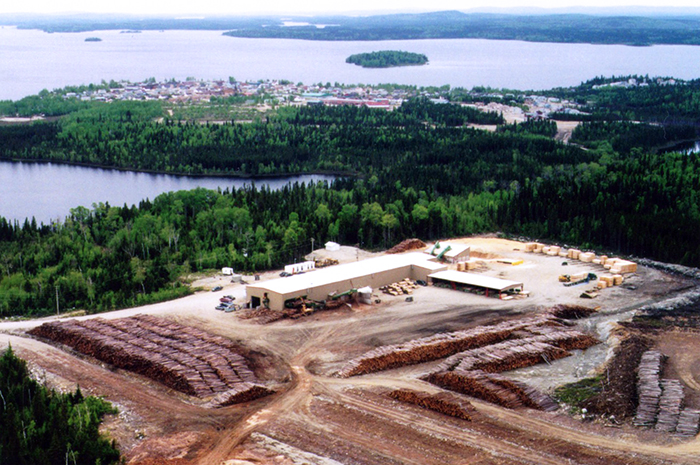The energy sector currently generates about three-quarters of greenhouse gas (GHG) emissions globally. Replacing polluting energy sources with renewable energy is clearly the answer to reducing emissions and meeting net zero targets. At the same time, remote and Indigenous communities are tasked with the challenge of making big changes in small towns.
While wind, solar and energy storage grew in Canada by 10.5 per cent in 2022, it is not enough to hit the growth rate needed to reach net-zero emissions by 2050, according to new data from the Canadian Renewable Energy Association (CanREA).
“Canada is just starting to take advantage of its wind and solar energy potential,” says Vittoria Bellissimo, CanREA’s president and CEO. “The country needs to do more to unlock the benefits of the enormous opportunities offered by renewable energy.”
So how do we amp up renewable energy systems across the country? Are there untapped opportunities to think outside of the box? It’s looking like biomass may be a part of the puzzle, while also supporting green jobs for remote and Indigenous communities.
The Conseil des Atikamekw d’Opitciwan (CAO), Hydro-Québec, and the Société en commandite Onimiskiw Opitciwan (SCOO) have forged a historic agreement to build a forest biomass cogeneration plant to supply Opitciwan. The future off-grid system will be the first of its kind in an Indigenous community in Quebec.

From left to right: Yvan-Roch Awashish, vice-president, Société en commandites Onimiskiw Opitciwan; Jean-Claude Mequish, Chief, Conseil des Atikamekw d’Opitciwan; Julie Boucher, Vice President – Sustainability, Community Relations and Communications, Hydro-Québec; and, Patrick Labbé, Chief innovation, major projects and conversion, Hydro-Québec. Image credit: Éric Massicotte for Hydro-Québec.
The agreement opens the door to the next stages of this project that’s been long desired by the community. With an installed capacity of 4.8 MW, the plant is scheduled for commissioning in July 2026. The 25-year agreement, which has the option of a 15-year extension, also involves the acquisition and installation of a dryer at the Opitciwan sawmill.
“The forest biomass cogeneration plant project holds great promise for our community and meets our essential electricity supply needs. Not only does it tick every box in terms of social acceptability, sustainability and technical viability, but it will also spur social and economic development,” said Jean-Claude Mequish, Chief of CAO.
Once in operation, the plant will ensure the community a reliable, sustainable and renewable electricity supply. The project will also contribute significantly to local job creation and economic development by consolidating and maximizing the activities of the sawmill, whose majority shareholder is the CAO.

The Opitciwan sawmill operates as a joint venture between CAO and Resolute Forest Products (RFP). Image credit: RFP.
“This is an excellent example of what we seek to attain in terms of sustainability: reducing our carbon footprint while generating positive spinoffs for the community,” said Julie Boucher, vice president of Sustainability, Community Relations and Communications, Hydro-Québec. “We are very pleased to be part of this project that has been so eagerly awaited by the community and which will have lasting positive impacts for Opitciwan.”
With the overall costs at an estimated $60.2 million, provincial and federal government contributions will be required along with investments from the proponents (SCOO and CAO). In terms of jobs, 40 workers will be hired for the construction phase, with about 15 permanent jobs to be created once the facility is up and running.
Lastly, though the current diesel generators must be kept as a back-up source to ensure power supply reliability, the project represents a major step forward in terms of environmental conservation and the fight against climate change. Diesel consumption is expected to decrease by roughly 85 per cent.
“Replacing the current diesel plant with one that’s powered by forest biomass from the sawmill is a huge step forward. Not only will the impact be economic, with new well-paid jobs and promising development prospects, but it will also have major benefits for the environment,” said Denis Clary, president of SCOO. “Cutting annual GHGs emissions is good for our people’s health and helps improve the environmental performance of Québec and Canada as well.”
The new facilities will optimize use of forestry resources, reduce noise and odor pollution, drastically cut fossil fuel dependence and significantly lower the transport related to diesel and wood products (bark and raw timber). In total, annual GHG emissions are expected to be reduced by 13,000 t of CO2 equivalent, or 325,000 t of CO2 equivalent over 25 years —results that are comparable to removing 5,000 cars from the roads each year.
With files from Eric Duguay, public relations officer from Conseil des Atikamekw d’Opitciwan and Francis Labbé, spokesperson from Hydro-Québec.
Featured image credit: Todd Diemer on Unsplash









